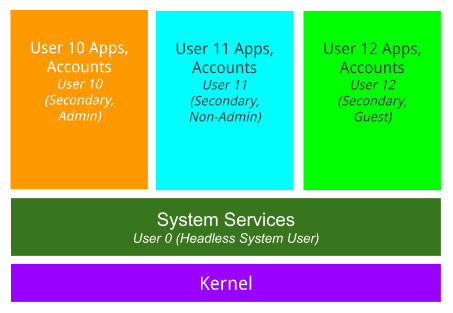Android از تنظیمات، برنامهها و دادههای چند کاربر پشتیبانی میکند. Android Automotive برای ارائه یک تجربه مشترک از دستگاه به پشتیبانی چند کاربره Android متکی است، که در آن هر کاربر دستگاه برای شخص فیزیکی متفاوتی در نظر گرفته شده است. در Android 10 و بالاتر، Android Automotive از این دسته از کاربران پشتیبانی می کند:
- کاربر سیستم هدلس . کاربر سیستم هدلس در پس زمینه اجرا می شود و همه سرویس های سیستم را میزبانی می کند. برای Automotive، کاربر سیستم برای استفاده و دسترسی مستقیم توسط یک شخص فیزیکی در نظر گرفته نشده است.
- کاربر معمولی . دستگاههای خودرو، دستگاههای مشترکی هستند و هر کاربر برای استفاده توسط شخص فیزیکی متفاوتی در نظر گرفته شده است. کاربران اندروید می توانند نقش های متفاوتی داشته باشند. برای اطلاعات بیشتر به نقش ها و محدودیت ها مراجعه کنید. در خودرو، همه کاربران عادی کاربران ثانویه هستند.
- کاربر مهمان. کاربران خودرو می توانند شامل کاربران موقت مانند دوستانی باشند که وسیله نقلیه قرض می گیرند. برای استفاده از این قبیل، Android Automotive دسترسی کاربر مهمان را به تمام اجزای مورد نیاز برای استفاده از خودرو فراهم می کند. فقط یک کاربر مهمان را می توان در یک دستگاه در یک زمان تعریف کرد.
نمودار زیر نشان می دهد که چگونه حالت کاربر سیستم بدون سر خودرو از تجربه چند کاربره پشتیبانی می کند:

شکل 1. تجربه چند کاربر.
برای کسب اطلاعات بیشتر، چند کاربره Android Automotive را ببینید.
نقش ها و محدودیت ها
وسایل نقلیه وسایل مشترکی هستند که ممکن است توسط افراد مختلف هدایت شوند. هر فرد می تواند کاربر خود را داشته باشد که هر کدام برنامه ها و داده های خود را دارد. با این حال، مالک وسیله نقلیه ممکن است بخواهد همه کاربران توانایی یکسانی برای اصلاح دستگاه نداشته باشند. بنابراین، Automotive از مفهوم ارائه نقشها و محدودیتهای مختلف به کاربران پشتیبانی میکند. نقش های کاربری زیر پشتیبانی می شوند:
- مدیر. به طور پیش فرض، کاربران عادی با نقش ادمین می توانند هر کاری را انجام دهند. کاربران ادمین می توانند نقش مدیریت را به سایر کاربران اعطا کنند.
- غیر ادمین بهطور پیشفرض، کاربران عادی با نقش غیر سرپرست نمیتوانند دادههای کارخانه را بازنشانی کنند، نقش سرپرست را به خود اختصاص دهند یا سایر کاربران را حذف کنند.
- مهمان بهطور پیشفرض، کاربر مهمان نه میتواند دادههای کارخانه را بازنشانی کند و نه کاربران دیگر را حذف کند. به طور پیشفرض، کاربر مهمان محدودیتهای دیگری دارد، مانند عدم امکان تغییر (افزودن یا حذف) حسابها، نصب برنامهها یا اعمال صفحه قفل. به طور پیش فرض، مهمان نیز زودگذر است.
همانطور که در بالا گفته شد، هر نقش دارای مجموعه ای از محدودیت های پیش فرض است به طوری که کاربر جدیدی که با آن نقش ایجاد شده است، همان محدودیت های مربوطه را دارد.

